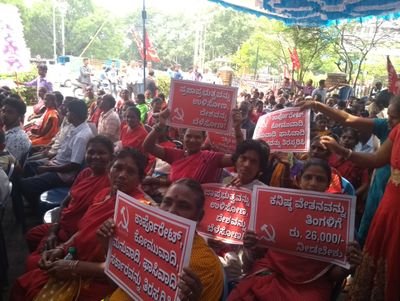In pursuance of the Code of Wages, 2019, the Government of Karnataka has brought out the Karnataka Code on Wages (Draft) Rules, 2021 on March 2, 2021. The All India Central Council of Trade Unions (AICCTU) has submitted its detailed objections to the same pointing out the complete inhumanity and illegality of the Draft Rules. In its submission the Union highlighted that bringing in the Rules at this juncture, when the country is being hit by the second wave of the COVID-19 pandemic and the working class has been pushed into a humanitarian crisis, is an opportunistic way to destroy the hard won rights of the working class.
Draft Rules not available in Kannada: The Draft Rules have only been made in English and the same have not even been made and put out in Kannada. This results in the exclusion of the vast majority of the working class, who form the affected class in this instance. There has been no publicity given to the Draft Rules to ensure that workers from across the State are made aware of it.
Reduction in minimum wages:The method of calculation of minimum wages proposed by the Draft Rules would result in a substantial reduction of wages and is blatantly violative of the orders of the Courts on this including in Workmen Represented by Secretary vs. Management of Reptakos Brett. And Co. Ltd. and Anr.[AIR 1992 SC 504]. Minimum wages is a dynamic concept which is required to grow with the development of the country and to bring people on a higher standard of living. However, the Draft Rules is highly regressive, pushing workers into abject poverty.
Also read: After a century of exploitation, Assam tea workers strike for fair wages
a. Number of consumption units: The Rules provide for the standard working class family which includes a spouse and two children apart from the earning worker; an equivalent of three adult consumption units. This formula is arrived at: 1 (male) + 0.8 (female) + 0.6 (child) + 0.6 (child) to total to 3 adult consumption units. Such an assignment of value is blatantly gender discriminatory, as it assigns lower consumption to the female adult member of the household, and keeps a child’s consumption at a mere 0.6. Additionally, it fails to consider the obligation to maintain parents. The consumption units that ought to have been 5 have been kept at a mere 3.
b. Calculation of Minimum Wages:The Draft Rules propose that minimum wages be calculated in complete disregard to the health and rights of the worker.
i. Food is to be calculated at 2,700 Calories, which is highly inadequate. It fails to take into consideration the actual dietary requirement of T energy (Calories), proteins, fats, minerals, iron, vitamins etc., and the special needs of various special groups like infants, pregnant/nursing mothers, children etc.
ii. Clothing is to be calculated at 66 meters cloth per year be taken per standard working class family, which is highly insufficient and fails to consider the needs of personal clothing, home textile requirements, footwear, socks and detergents including stitching charges.
iii. Housing and Shelter: The Rule proposes that rent expenditure is to constitute 10% of food and clothing expenditure. This is completely out of touch with reality with high rise in rent costs. It is completely absurd to calculate rent as a percentage of the cost of food and clothing, instead of looking at the actuals.
iv. Fuel, electricity and other miscellaneous items is provided to constitute 20%of minimum wage, without considering the cost of cooking gas, vehicle fuels and electricity has seen a sharp rise in the past few years.
v. Children education, medical requirement, recreation and expenditure on contingencies is taken as 25% of minimum wage, without considering the increase in costs with privatization in both education and health.
A calculation of minimum wages under the existing law and the proposed rules with the specific change in the manner of calculation of rent, reduces the wages of workers from Rs. 9,935.61 to Rs. 5,935.61.
Also read: Forced Resignations of Garment Workers in Bengaluru : A Study
Revision of dearness allowance: Growing inflation requires the increase in Variable Dearness Allowance (VDA) to combat growing price rise. Instead of mandating the same, the Draft Rules provides that a mere “endeavour shall be made” for the same. This means that workers could be required to work for artificially lowered wages, which do not consider the increase in cost of living.
Vacuum in regard to Equal Remuneration: The Draft Rules creates a vacuum in the law as it fails to make provisions for the manner of raising a dispute in cases of discrimination in remuneration between men and women, which is provided for under the existing law.
Lack of publicity: The Draft Rules fails to provide for ensuring the publicity to minimum wages and the rights of workers, which is provided under existing law. Existing obligations on employers to display rates of wages and the details of inspectors to whom complaints can be made has been done away with.
Also read: BBMP Civic Workers Protest for Equal Pay for Equal Work




[…] ಚೆಪಾಕ್-ತಿರುವಳ್ಳಿಕೇಣಿಯಲ್ಲಿ ಪ್ರಚಾರ ಮಾಡುತ್ತಿದ್ದ ಸಂದರ್ಭದಲ್ಲಿ, “ಪಳನಿಸ್ವಾಮಿ ಸಿಎಂ ಆಗುವ ಮುಂಚೆ ಯಾರಿಗೂ ಗೊತ್ತಿರಲಿಲ್ಲ. ಅವರು ಪಕ್ಷ ಬೆಳೆಸದೆ ಅಧಿಕಾರಕ್ಕೆ ಬಂದಿದ್ದಾರೆ. ಹಾಗಾಗಿ ಅವರ ಜನನ ಅಕ್ರಮ ಮತ್ತು ಅಕಾಲಿಕ” ಎಂದು ಅವಹೇಳನಕಾರಿ ಹೇಳಿಕೆ ನೀಡಿದ್ದರು. ಇದಕ್ಕೂ ಮೊದಲು ಮುಖ್ಯಮಂತ್ರಿಯನ್ನು ಡಿಎಂಕೆ ಮುಖ್ಯಸ್ಥ ಸ್ಟಾಲಿನ್ ಅವರ ಚಪ್ಪಲಿಗಿಂತ ಒಂದು ರೂಪಾಯಿ ಕಡಿಮೆ ಎಂದು ಕರೆದಿದ್ದರು. […]